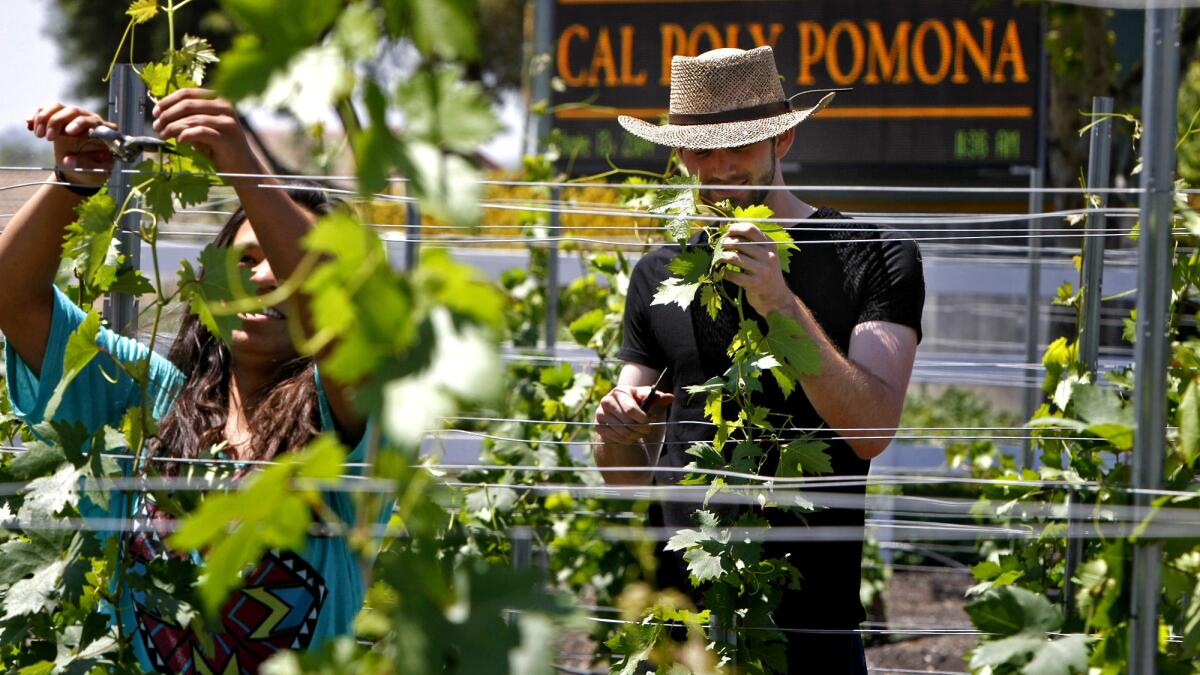Finally, a story about underage drinking with a happy ending

- Share via
Imagine attending culinary school and never being allowed to taste the food you cook. Or music school, and never be allowed to hear the music you make.
That, basically, is what it’s been like for undergraduates at California’s public colleges and universities who choose to major in winemaking and beer brewing. If they are under 21, they can’t sample the very substance to which they have devoted their academic lives.
It’s ironic, given that any college kid can get falling-down drunk any weekend without much threat of legal repercussion.
But in classrooms, drinking is illegal, even when the student is trying to produce the perfect Zinfandel, or at least understand what goes into making wine taste good or bad.
“I suppose one or two students over the years may have tasted wine illegally,” said UC Davis enology professor Andrew Waterhouse. “But when we are teaching classes we have to follow the law, that’s the way it is.”
The law will change in January. It is long overdue, but California lawmakers finally passed a bill that will let underage college students taste what they brew and ferment.
There are caveats, to be sure.
Adrian Lopez, UC Davis’ director of state government relations, told me the new law applies only to public schools that have accredited enology and brewing programs, that a student has to be at least 18 and part of the major, that the alchohol must be in possession of an instructor who is of age, and, tragically (my word, not his), the student may not swallow.
“They can swirl it in their mouth to taste the defects, or how the fermentation process is going,” he said.
Which is the whole point, said Waterhouse, a chemist who pushed for the new law. Waterhouse’s lab studies the effect that oxidation has on the development of color in red wine. He is working on ways to retain the flavors that are inevitably lost in the oxidation process.
Until now, he said, students younger than 21 have been able only to sniff the wine they are learning to make. You cannot develop a palette by sniff alone.
Still, there is no question students who can’t taste are missing out. “Wine tastes totally different when it’s being made,” said Waterhouse. “If you are trying to figure out what’s going on in the wine, you have to taste to perceive problems. That’s why winemakers taste their wine every day during fermentation. If there’s a problem, they want to intervene.”
The prohibition has been more than a palette problem for students. As my colleague Carla Rivera noted in this story about the law before Gov. Brown signed it last week, not being able to taste wine has forced many students to postpone coursework—and even spend additional time in school--as certain classes are open only to students who are 21.
California has been a powerhouse winemaking state for nearly half a century. Viticulture research has been a feature of the University of California since its inception in the late 19th Century, Waterhouse said.
So what on Earth took so long to get this law passed?
No one really knows. Lopez speculated that the schools were scared off because Califoria’s legal drinking age—21-- is enshrined in the state Constitution. (It’s in a section of Article XX called “Miscellaneous subjects.”)
“There was a perception that it would require a constitutional amendment,” Lopez said, which no one wanted to take on. But when he researched the issue, he found that 12 states already have educational exemptions that allow students to taste alcohol in the classroom.
He also discovered that California already had one exemption to its prohibition on underage drinking, which seemed to pave the way for this one. That law says underage California drinkers cannot be prosecuted if they seek medical help for a friend who is dangerously inebriated. (Parents of underage drinkers: Please share that with your kids.)
With the approval of University of California President Janet Napolitano, Lopez found a legislator, Arcata Democratic Assemblyman Wesley Chesbro, whose district includes part of Sonoma County, to carry the bill. It sailed through both houses of the California Legislature, nearly opposition free.
On Monday, Gov. Jerry Brown signed it into law.
It’s so rare that stories about underage drinking have a happy outcome. I just had to share this one.
You’ll get drunk on life when you follow me on Twitter: @robinabcarian
More to Read
Sign up for Essential California
The most important California stories and recommendations in your inbox every morning.
You may occasionally receive promotional content from the Los Angeles Times.











